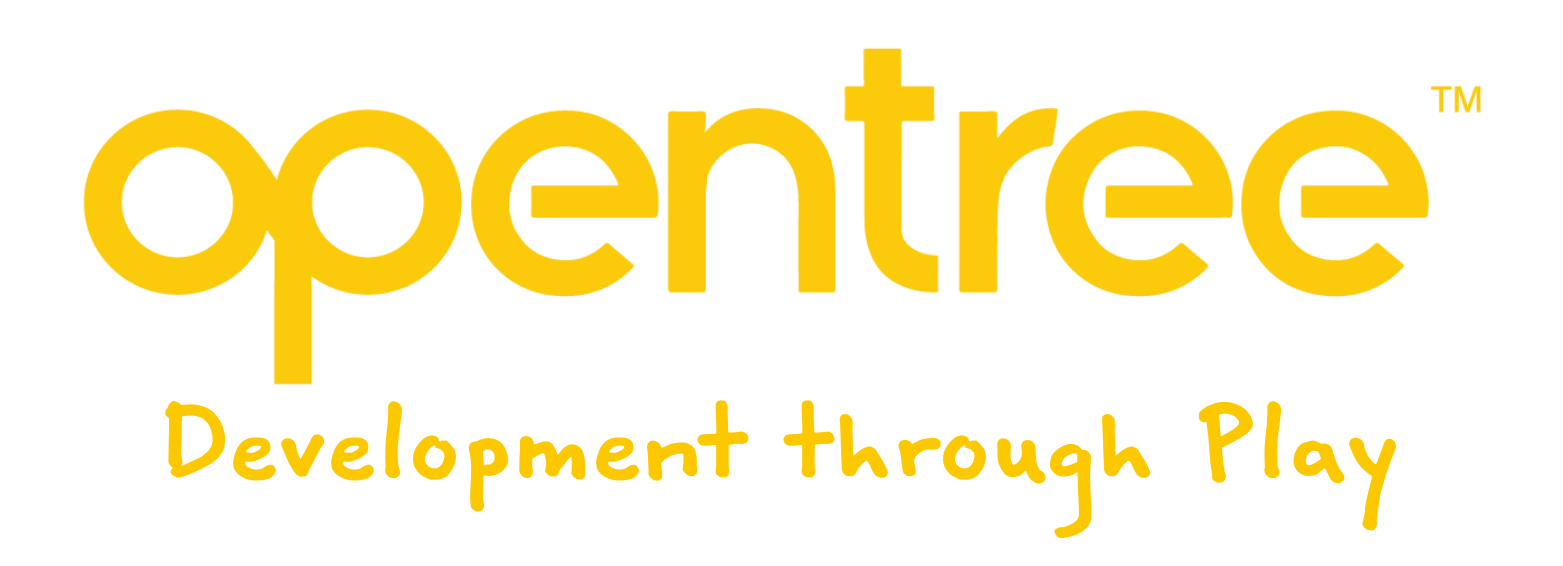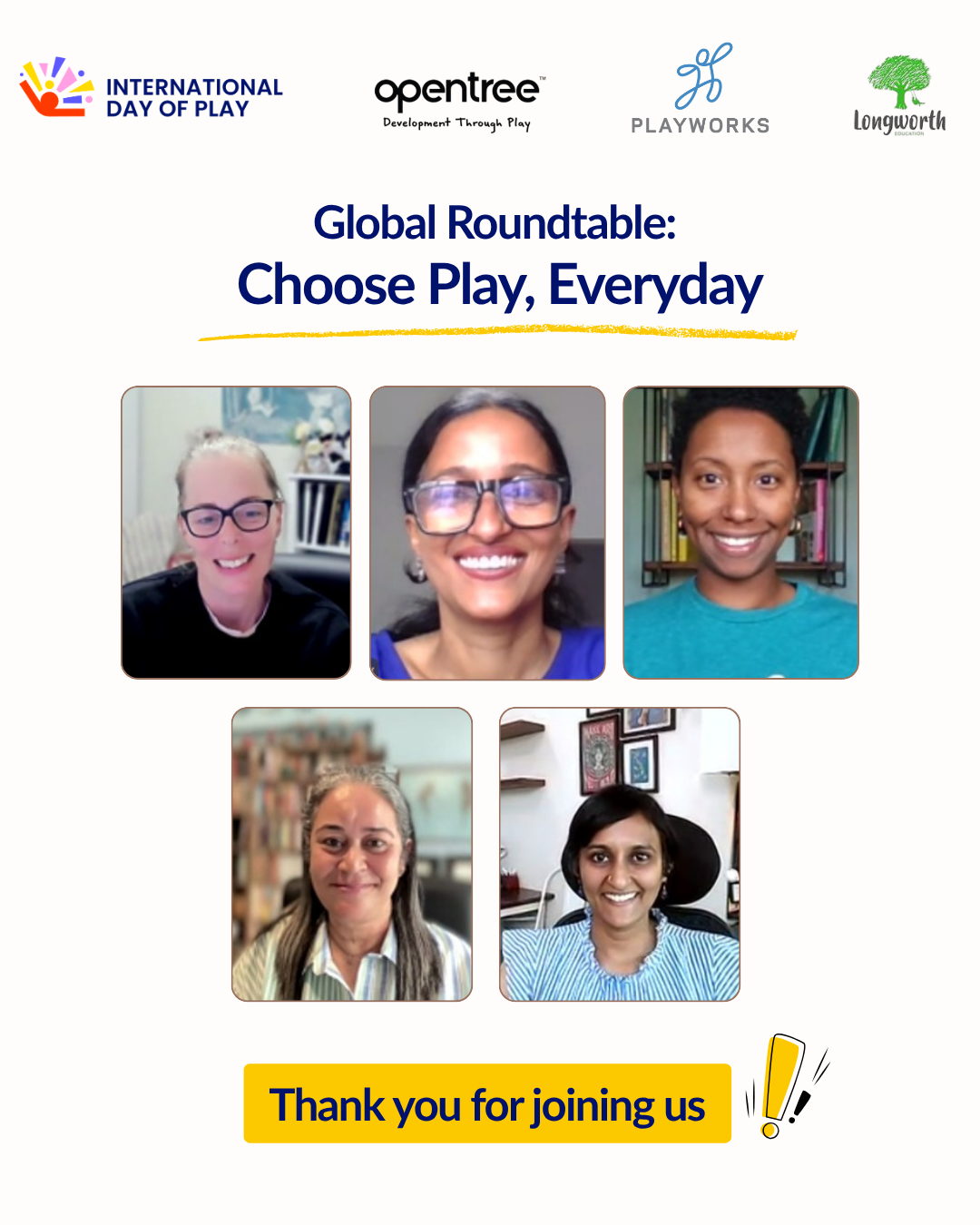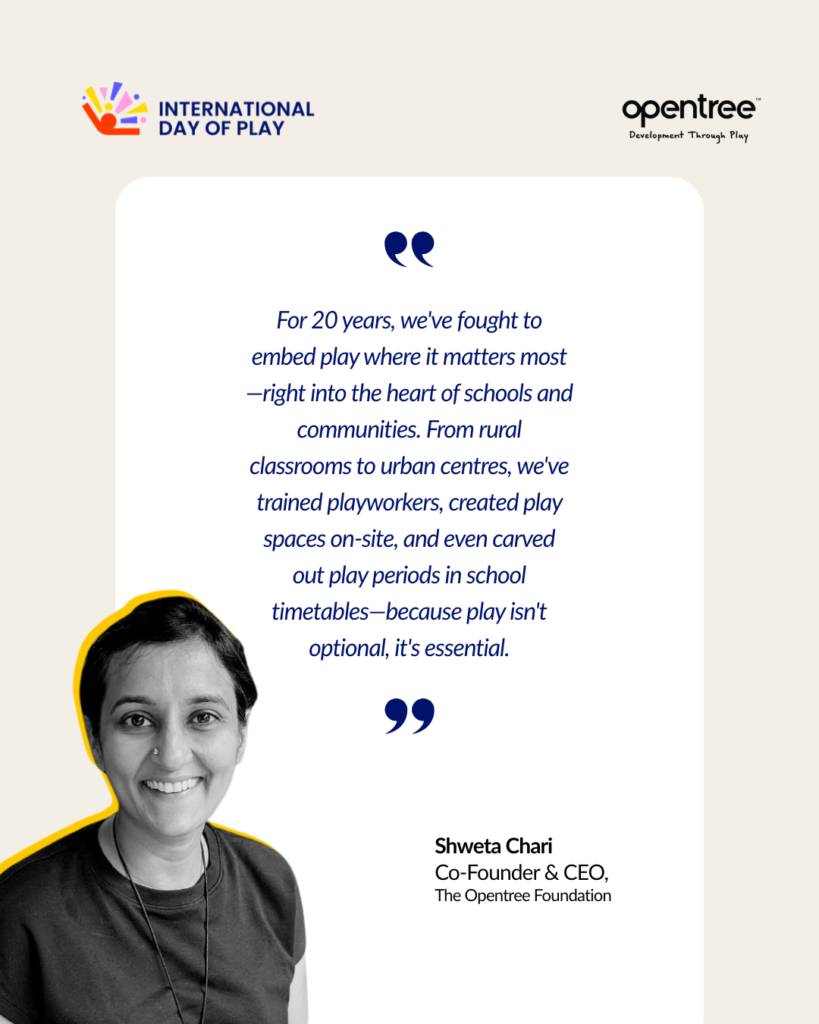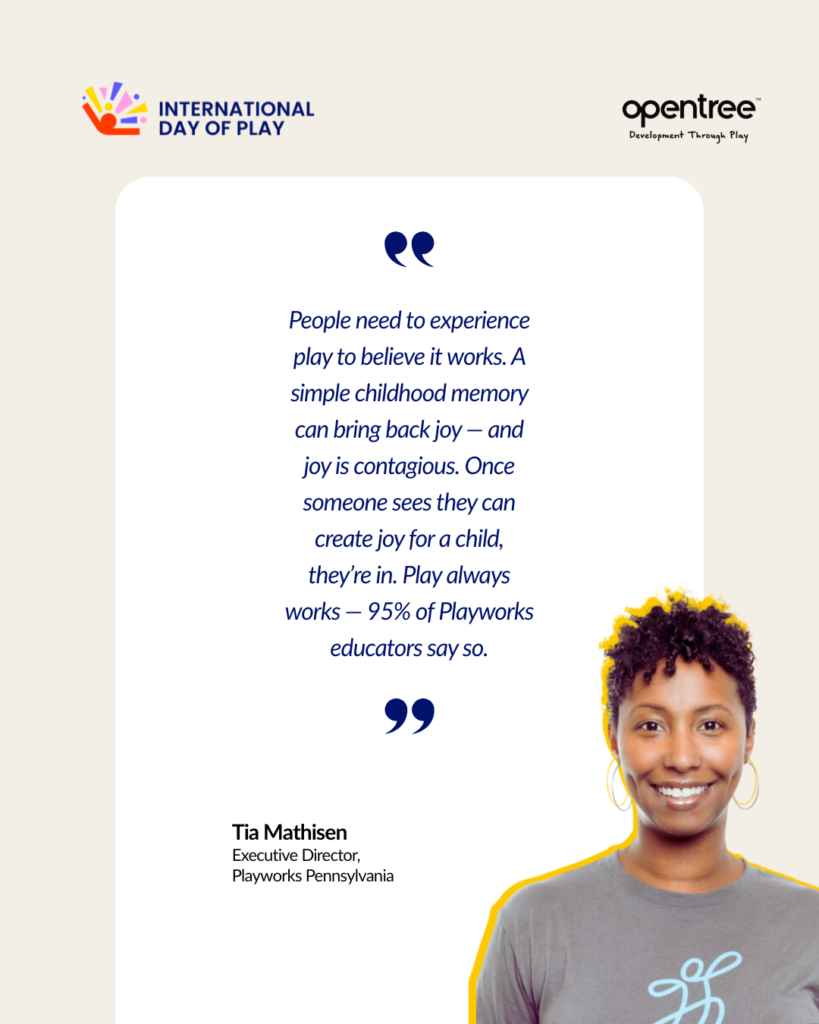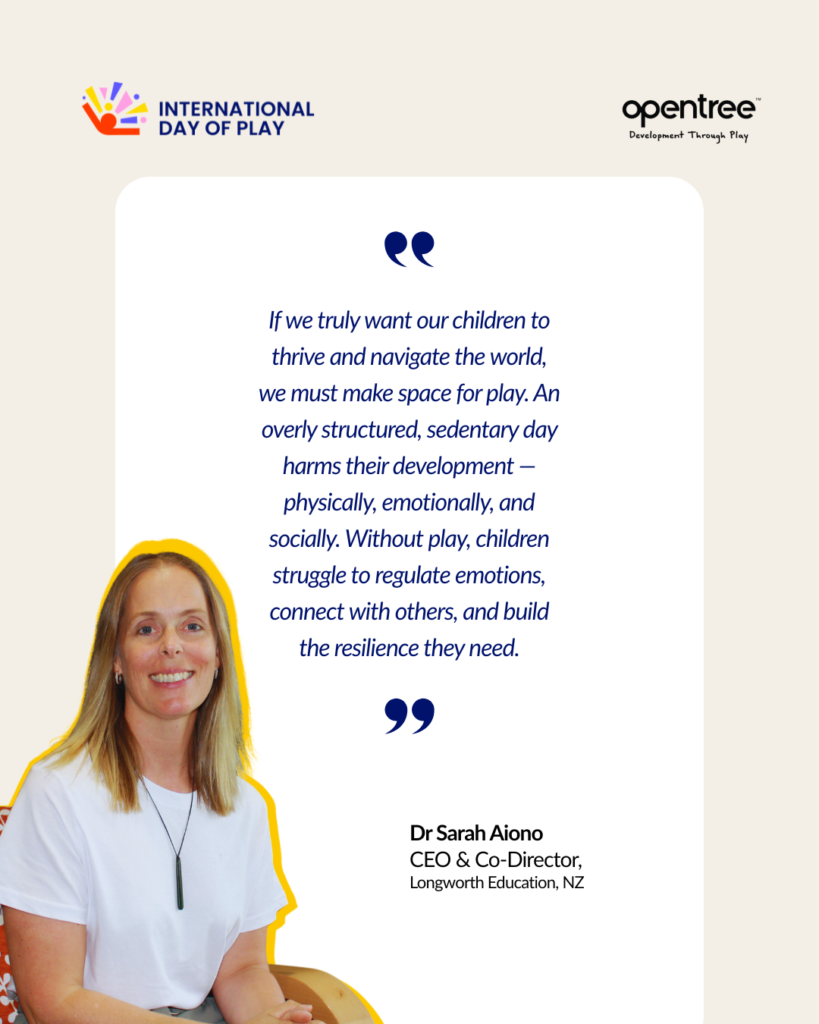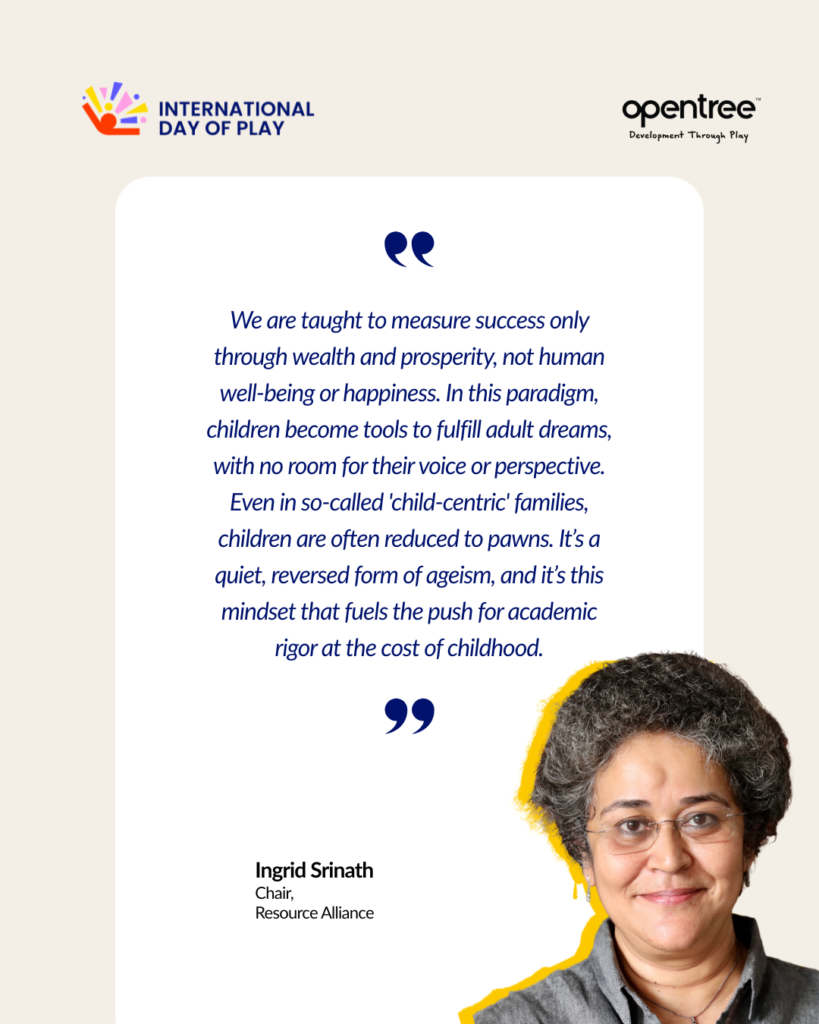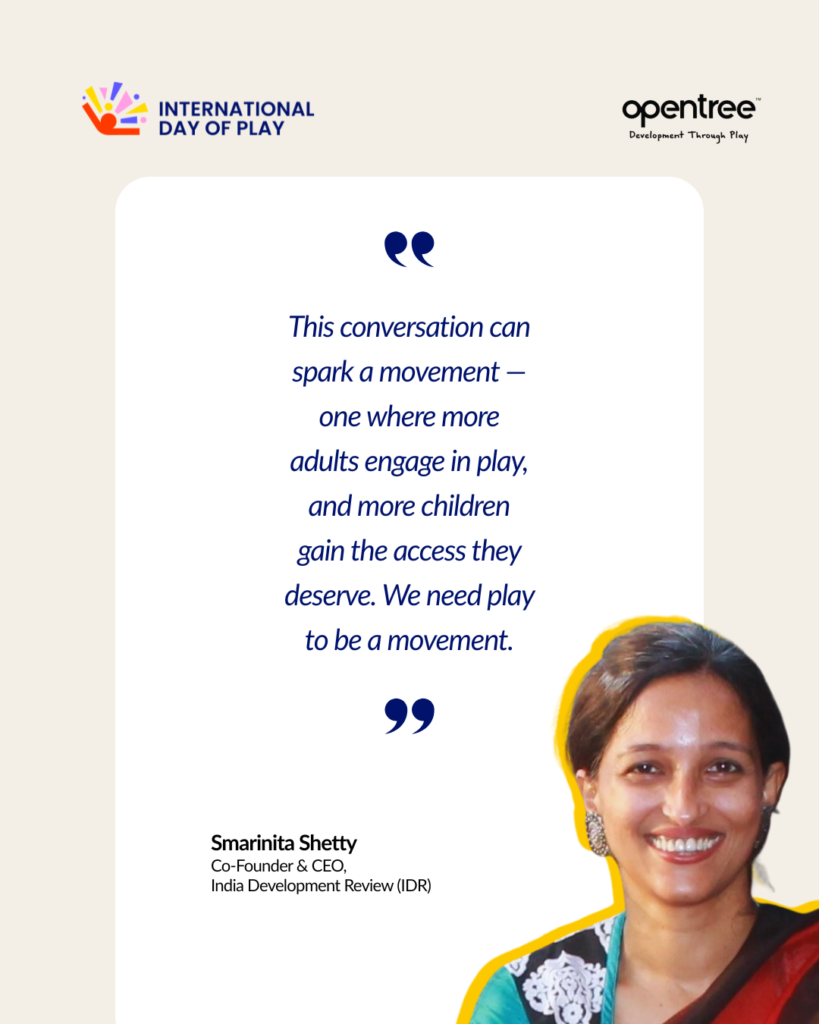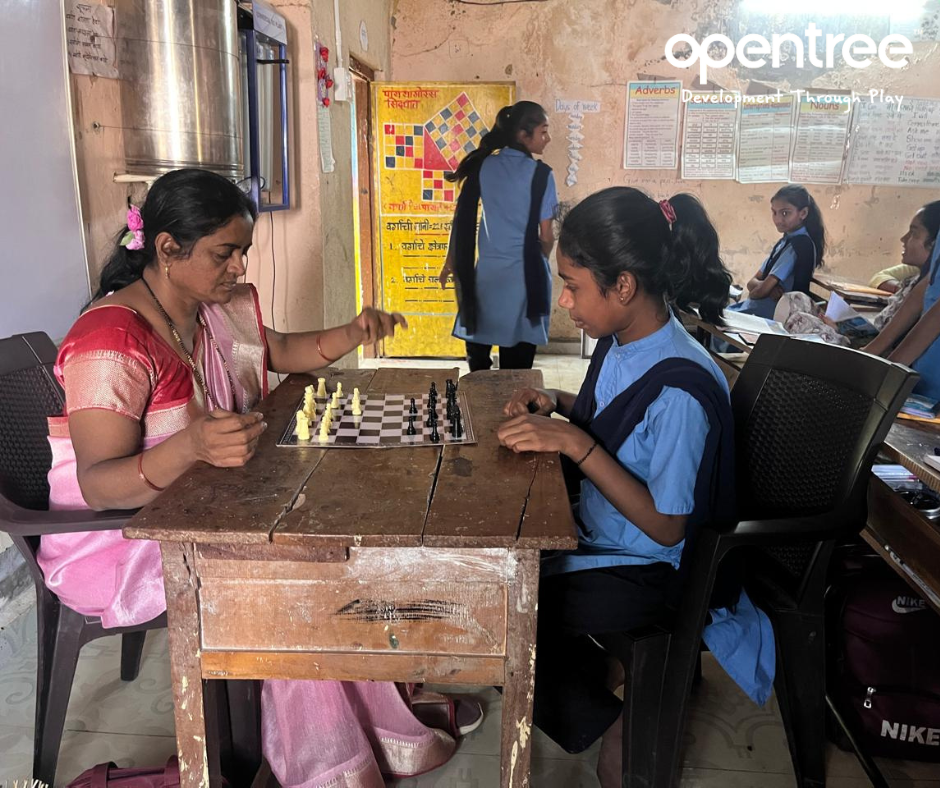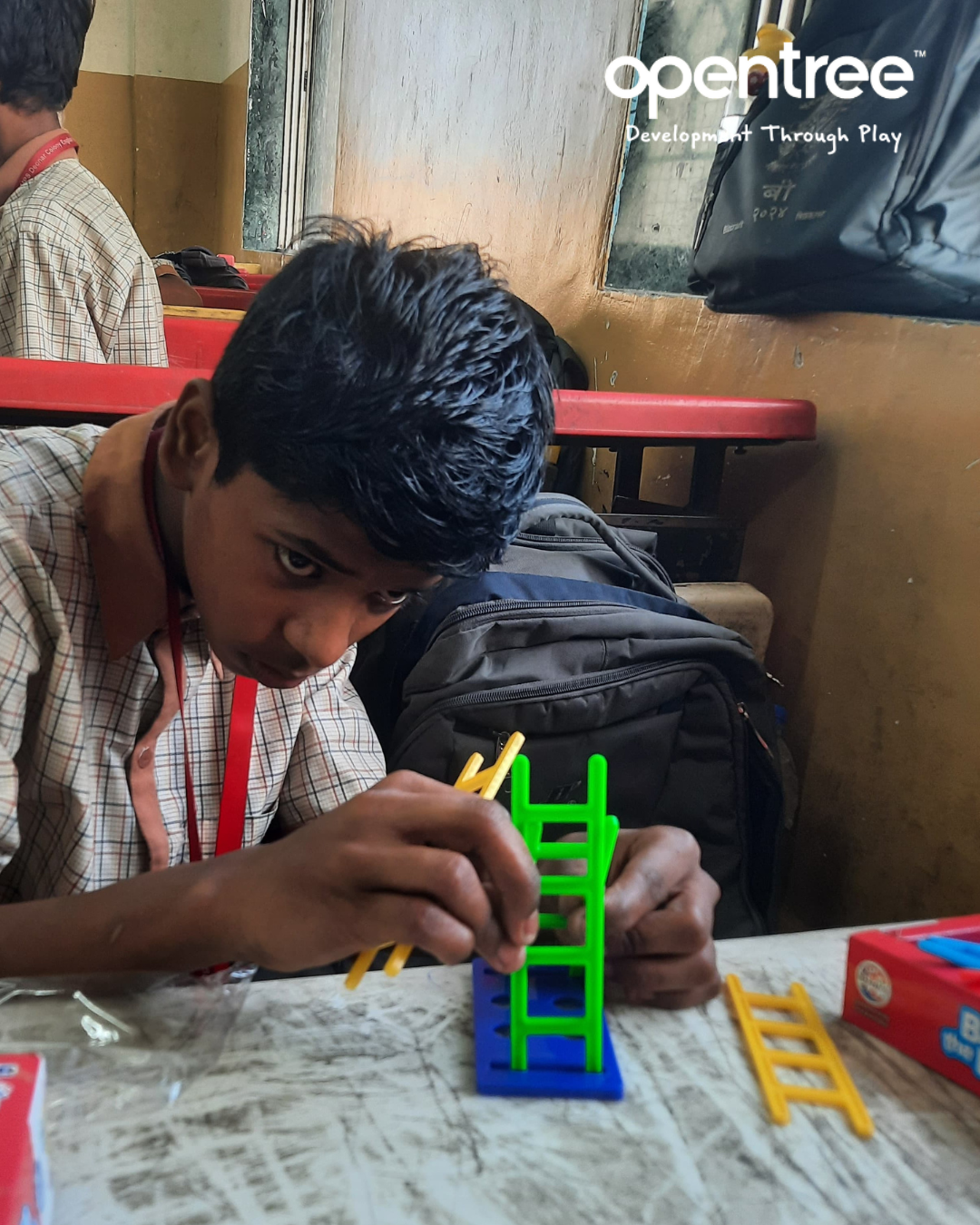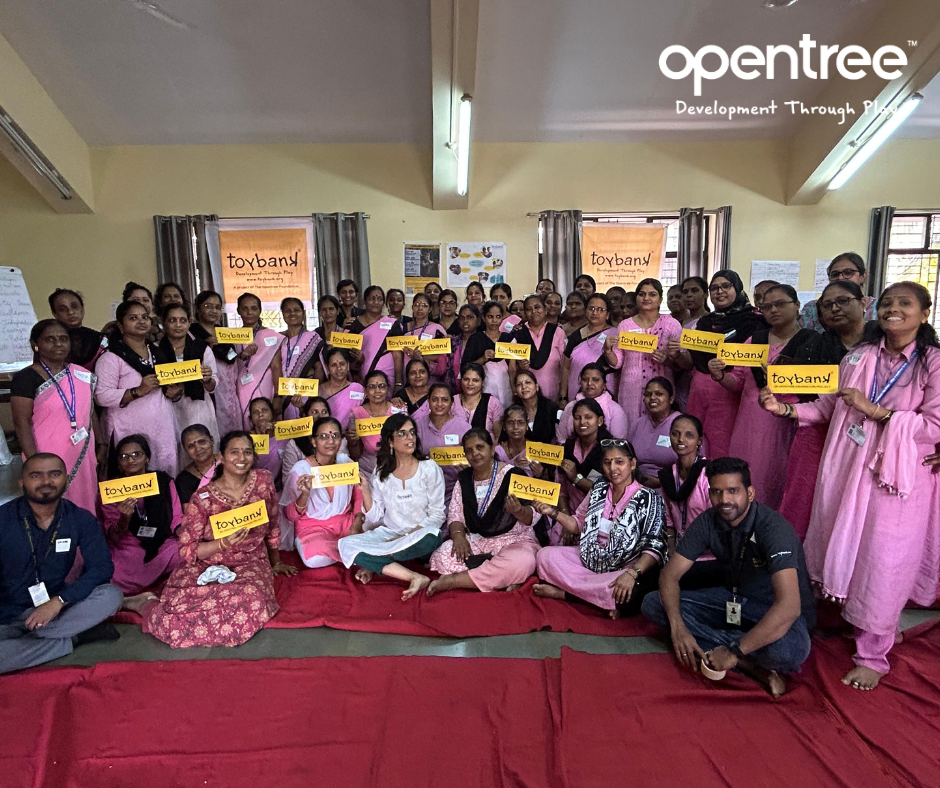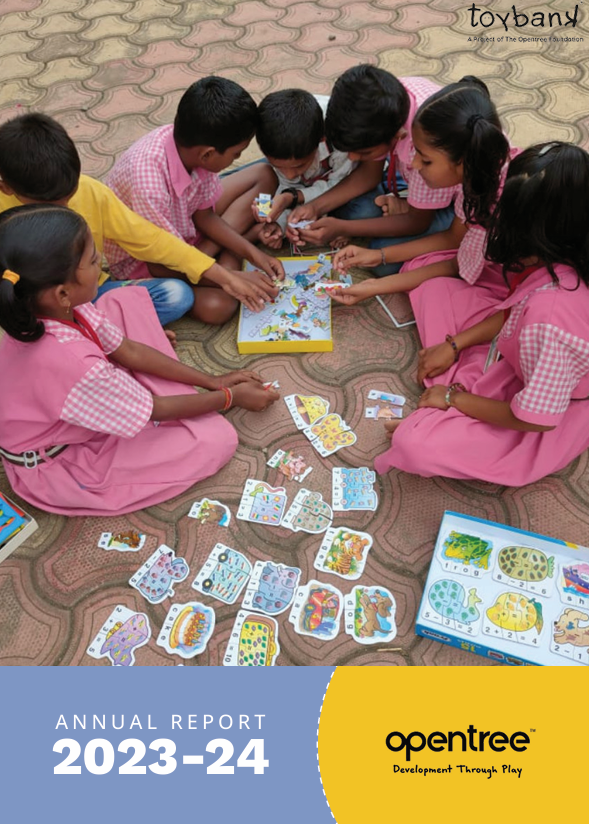Playful Learning: Class 8 Students Discover Power of Play Through Game Design
Class 8 students of Govind Nagar English School in Malad recently wrapped up their academic year with a playful but powerful experience that demonstrated how deeply play supports learning and skill-building, and what the students had learned through play sessions.
The previous play sessions have exposed them to different kinds of games and got them thinking about the different aspects of problem-solving such as asking questions to find information about a problem, brainstorming solutions for a problem, how do you pick the correct idea and so on.
In this session, we asked students to think about the structure and design of a game. There was a detailed discussion with students about what goes into making the game and how games are designed. Then, there was a conversation about what goes into a game’s mechanics: what are the rules, how does the game progress forward, are there any intentional challenges that are created. For example: in snakes and ladders, you have a snake right before the last block, which makes it difficult for the player to win immediately. We had a conversation with students about how these factors together make a game interesting and then we asked them to develop their own games.
At first, the task felt daunting. A certain group of students were not sure where to begin or how to even structure a game. This is where our Outreach Play Worker (OPW) stepped in and asked them to begin with brainstorming. This encouraged the students to tap into one of the most important skills that play nurtures — creative thinking. As they shared ideas and built on one another’s suggestions, their confidence grew. They decided to design a quiz-based board game with general knowledge as the theme.
The process of creating their own game allowed students to practice collaboration, problem-solving, and communication. They worked together to design a colorful board, draft thoughtful questions, and list down clear rules. Their game was called Mind Masters: General Knowledge.
Following this, the students engaged in feedback, another essential life skill. Members from different groups played their game and provided constructive feedback. The teams analysed it and discussed what could improve, especially in terms of design and rules. They realised their game could be more engaging if they expanded it, so they decided to include questions about different capitals of countries and not just limit it to India, to make the game more challenging.
This iterative process of building, testing, receiving feedback, and refining their ideas helped the students broaden their thinking. They were more open to try something new or adjust their ideas based on group discussions. Each team member brought a unique perspective, and through this collaboration, they strengthened not just their game, but also their interpersonal skills.
Their journey shows that when children are given the space to explore, create, and collaborate through play, they naturally develop critical skills like creativity, adaptability, teamwork, and problem-solving.
This game design activity wasn’t limited to one school. Across Mumbai, students in 12 different schools participated in this creative challenge as part of our play programmes. Each group developed a unique game that reflected their ideas and teamwork. Here’s a glimpse of the games they created:
Match the Card
Grade 6 – MHB Urdu School No. 1
In this memory-based game, players must match pairs of cards. All cards are shuffled and laid face down. Players take turns flipping over two cards at a time. If the cards match, the player keeps the pair and gets another turn. If they don’t match, the cards are turned back over, and the next player takes a turn. The player with the most matched pairs at the end wins.
Shark Attack
Grade 7 – MHB Urdu School No. 1
This exciting elimination game keeps players on their toes. A pile of chits — small slips of paper — is prepared, with most being blank or marked safe, and one featuring a shark. All the chits are tossed into the air or laid out face down. Each player picks one at random. The player who picks the chit with the shark is immediately out of the game. The remaining players repeat the process with the remaining chits, continuing round after round. The game goes on until only one player remains — and that player is crowned the winner. Simple, quick, and full of suspense.
Scale Ludo or Ludo Climb

Grade 8 – Govind Nagar Hindi School
Ludo Climb or Scale Ludo is an exciting twist on the classic Ludo game, designed to test both luck and strategy. Instead of traditional numbered dice, players use a special dice marked with plus and minus signs. The game is played on two vertical scale boards, where players either move up or down based on their dice roll. A plus sign lets the player climb higher, while a minus sign pulls them back down the scale. The challenge is to navigate the ups and downs and be the first to reach the top — known as the “head” — to win the game. With its unpredictable moves and race-to-the-top format, this game adds a new layer of excitement to a familiar favourite.
The Way Home

Grade 8 – Govind Nagar Hindi School
The Way Home is a journey-themed board game where players must travel through exciting checkpoints — a cave and a lake — before reaching the final destination: home. The path is set, and every player must visit all the key locations in the correct order to move forward. Skipping a checkpoint isn’t allowed, adding an extra layer of strategy. The first player to successfully complete the entire route and reach home wins the game.
Oops! Ladder

Grade 6 – MHB Urdu School No. 2
Oops! Ladder is a fun and tricky version of the classic Snakes and Ladders. To start the game, players must roll a 3. If you roll a 4 during the game, you have to move 4 steps backward. The board also has surprise spots — if you land on a number that ends in 0 (like 10, 20, or 30), you go all the way back to the start. Landing on a number that ends in 5 (like 5, 15, or 25) makes you move 10 steps back. The game is full of unexpected twists, making it more exciting and challenging with every move.
Colour Clash
Grade 8 – Malvani Township English School
Colour Clash is a vibrant card game inspired by Point Salad, but with a twist — instead of vegetables, players collect colourful cards. Each card represents a different colour, and players must match them in specific combinations to earn points. The more strategic the match, the higher the score. The game encourages players to recognise patterns and think ahead while making quick decisions. With its bright visuals and simple rules, Colour Clash is a fun way to test memory and strategy.
Countdown Race

Grade 8 – Malvani Township English School
Countdown Race is a thrilling board game where players begin at tile 80 and race their way down to tile 1. Along the way, special coloured tiles give players a boost — orange tiles move you 2 steps forward, pink tiles give you a big jump of 6 steps, and purple tiles add 1 step forward. Players must think carefully about their moves and use the colour boosts wisely to reach tile 1 first and win. It’s a fun mix of luck and strategy, with every move bringing players closer to victory.
Spinning Vegetables

Grade 8A – MPS CBSE Rajawadi School
This is a fast-paced observation game. A spinner indicates a colour, and the player has 15 seconds to find and name three items of that color. Successfully finding all three within the time earns points. The player with the most points at the end wins. The vegetables have been drawn as a guidance so the players get a nudge, incase they cannot think of anything from the respective colours.
Find the Treasure

Grade 8A – MPS ICSE Dadar Wolen School
Find the Treasure is an exciting maze-based game where players embark on a journey to find hidden treasure. Players are given three possible paths to choose from, but beware — choosing the wrong path means you must start over. The challenge is to navigate the maze correctly and be the first to reach the treasure. It’s a game of luck and strategy, where every decision brings you closer to victory.
Fit and Play

Grade 7 – MPS CBSE Tunga Village
Fit & Play is a dynamic and healthy game that combines exercise with fun. Players shuffle blocks on a board filled with different exercise poses. Wherever the block lands, the player must perform the exercise shown on that square. The goal is to stay active and have fun while completing the different exercises.
Do If You Can

Grade 7 – MPS CBSE Mithagar
Do If You Can is an action-packed game where players must complete various challenges to move forward. Using a deck of 31 cards, each labeled with a number, players draw a card and then refer to the challenge board to see what task corresponds to that number. The tasks range from physical activities to mental puzzles. Players must complete the challenge before they can continue in the game. It’s a test of skill, determination, and fun as players race to finish the challenges and become the winner.
These game-design sessions are more than just fun projects. They’re a way for students to explore ideas freely, express their creativity, and develop essential life skills. When children are given time, space, and guidance to create through play, they build a mindset that values exploration, teamwork, and growth.
Cooking Up Skills Through Play With Little Chefs
It all began with a simple craving — a craving for pizza. But this time, it wasn’t just about eating it. It was about making it. Together.
The idea sparked during playtime, as the children chatted about their favourite foods, and just like that, they decided to make their own pizza and the game was on.
What followed was no ordinary kitchen activity — it was an adventure led entirely by the children, powered by imagination, curiosity, and joy. First, they huddled together to list all the ingredients they would need. Tomatoes, cheese, onions, bell peppers… the list grew longer with every excited suggestion.
Then came the expedition. With shopping lists and bags in hand, the little team set off to the vegetable market, the dairy, and even a nearby supermarket. They asked questions, compared prices, bargained shyly, and learned how to choose the freshest produce. The bags were heavy, but not one complaint was heard — because they carried them together.
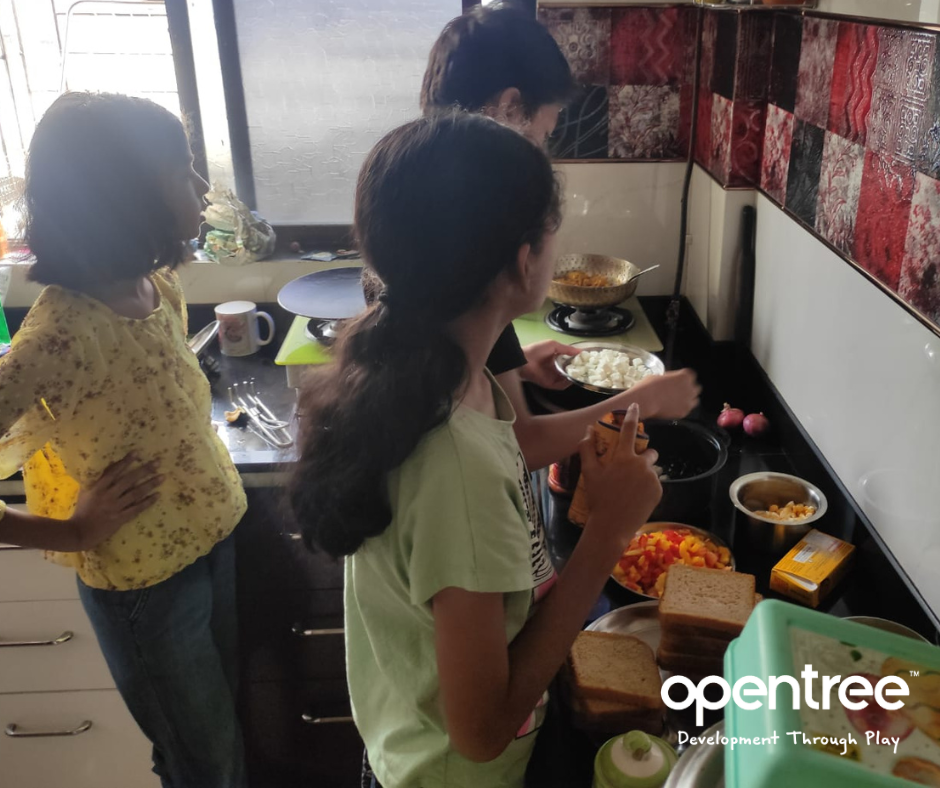
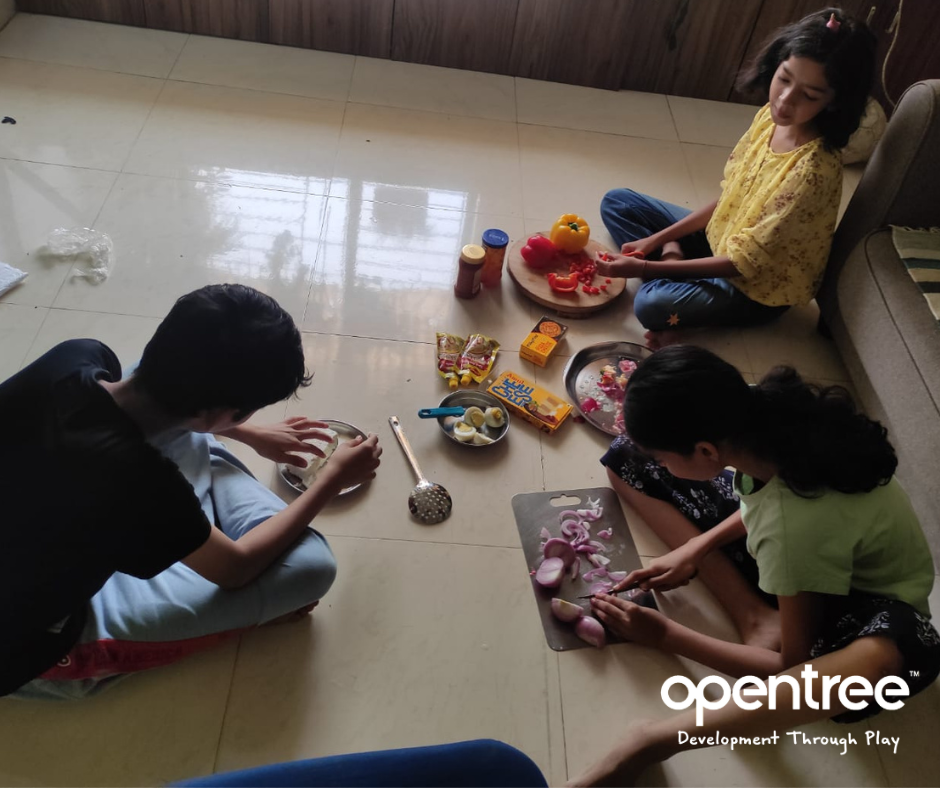
Back home, play turned into purpose. Sleeves rolled up, hands washed, and vegetables rinsed. Some chopped while others debated the best topping combinations. It was messy, noisy, but perfect. Each child had a role, and every task was a tiny triumph — from slicing mushrooms to spreading sauce just right. They took turns, shared tools, and offered encouragement.
When the pizzas were finally ready, they gathered around like proud chefs at a grand feast. It wasn’t just about the taste — it was about the journey. The teamwork, the creativity, the hands-on problem-solving. And the play.
This wasn’t a structured lesson. There were no worksheets, no formal instructions. Yet, in that afternoon of pretend play turned into a real-life project, they learned more than any textbook could offer — how to collaborate, communicate, plan, adapt, and most of all, how to turn ordinary moments into extraordinary memories.
This activity reminded us that play is not separate from learning — it is learning.
Written with inputs from Vijay Suryavanshi, a longtime volunteer at The Opentree Foundation and a supporter of play and play-based learning.
Play, Practice, Checkmate: How Play Sessions Sparked Mansi’s Rise to State-Level Chess
Mansi (name changed) is a Class 7 student at the Zilla Parishad Primary School in Wanwada, Latur. Mansi lives with her siblings, grandparents and parents, who are farmers.
While she is average in academics, she has a keen interest in extracurricular activities. In June 2024, when we introduced play sessions in her school, she was instantly fascinated with the game of chess. She did not know how to play it and had asked other groups in class if she could join them, but they refused, as they all knew the game and had formed their groups. She was still determined to learn it. Though it seemed complex at first, with all its intricate rules and movements, Mansi started observing the other students and tried understanding the game. She learned the basics by merely observing her peers.
One day, Mansi gathered the courage to ask her teacher, Jyoti, if she would play a game of chess with her. Jyoti, who has attended multiple workshops organised by The Opentree Foundation, is a Play Practitioner and often encourages children to play and uses play-based learning in her teaching. When Mansi came with her request, Jyoti readily agreed. During the game, Mansi made several mistakes, but Jyoti remained patient and supportive. Instead of pointing out errors, she took the time to explain what Mansi could do differently, offering advice on strategies and tactics. When her classmates and others overlooked her attempts, it was Jyoti who encouraged Mansi to keep practicing, providing consistent guidance and motivation. Mansi had found a reliable guide who pushed her to persist, experiment, and improve.
Following Jyoti’s guidance, Mansi began playing chess more frequently with her classmates and also her brother at home. What had started as a challenge soon became a passion for her. She began participating in class chess competitions. At first, she lost a few games, but did not let it discourage her. Each defeat taught her something new, and her chess skills and strategies gradually improved. Mansi’s perseverance eventually paid off when she won a chess competition in her class. This achievement motivated her to compete in a school-level chess tournament in February 2025, where she secured the first rank.
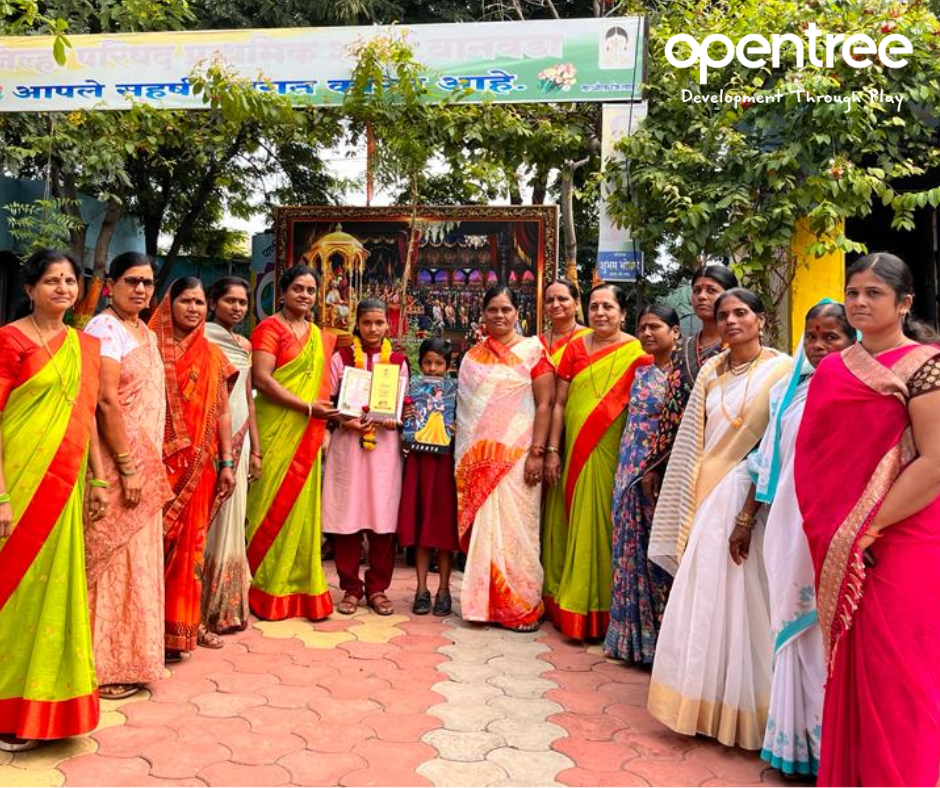
This win marked a turning point for her. As a result of her dedication and practice, she was offered the opportunity to represent her school at the taluka and district levels in the same month. Once again, her hard work led to a first-place finish, which further boosted her self-confidence. Her journey took a significant turn as she went on to represent her school at the state-level. Although she did not win the state competition, she was not discouraged. Instead, she recognised the immense value of the experience and how far she had come, from knowing absolutely nothing about chess to participating in a state-level competition. Her journey is one of determination, growth, and self-discovery.
Mansi’s journey is a powerful reminder of how play can transform a child’s self-image, confidence, and future. Through something as simple yet profound as a game of chess, Mansi discovered her strengths, learned to persevere, and developed a love for learning beyond the classroom. Play not only gave her a voice and a platform but also helped her connect with a supportive adult who believed in her potential. This is exactly the kind of impact The Opentree Foundation strives to create — ensuring that every child has the right, space, and encouragement to play. Through play-based learning and the dedication of Play Practitioners like Jyoti, TOF is helping children unlock their hidden talents, build essential life skills, and thrive in every aspect of their growth.
How Play Fosters Inclusivity, Builds Confidence, and Connects Every Child
It was just another day at Deonar Colony, where a Toybank play session was underway. The room was buzzing with excitement and laughter, children busy in discussions, strategising, putting their best ideas forward on how to play the games to the best of their abilities. Among these children was Afzal, a determined Class 7 student. Afzal is a child with physical disabilities and finds everyday activities difficult. His classmates would not include him in games and this bothered Afzal, as he felt lonely.
However, on a particular day, the power of play revealed itself in an extraordinary way.
As the play session began, children eagerly rushed to the table of board games and play kits. Afzal stepped forward and asked our Outreach Play Worker if he could take a game that he could play by himself. He was handed Balance The Ladders — a game that requires precision and patience. It wasn’t easy for him. He tried, failed, and tried again. His first attempts ended in the ladder toppling over. But the game had sparked a desire to keep going. Play is a powerful motivator for children as it taps into their natural curiosity, creativity, and desire for joy.
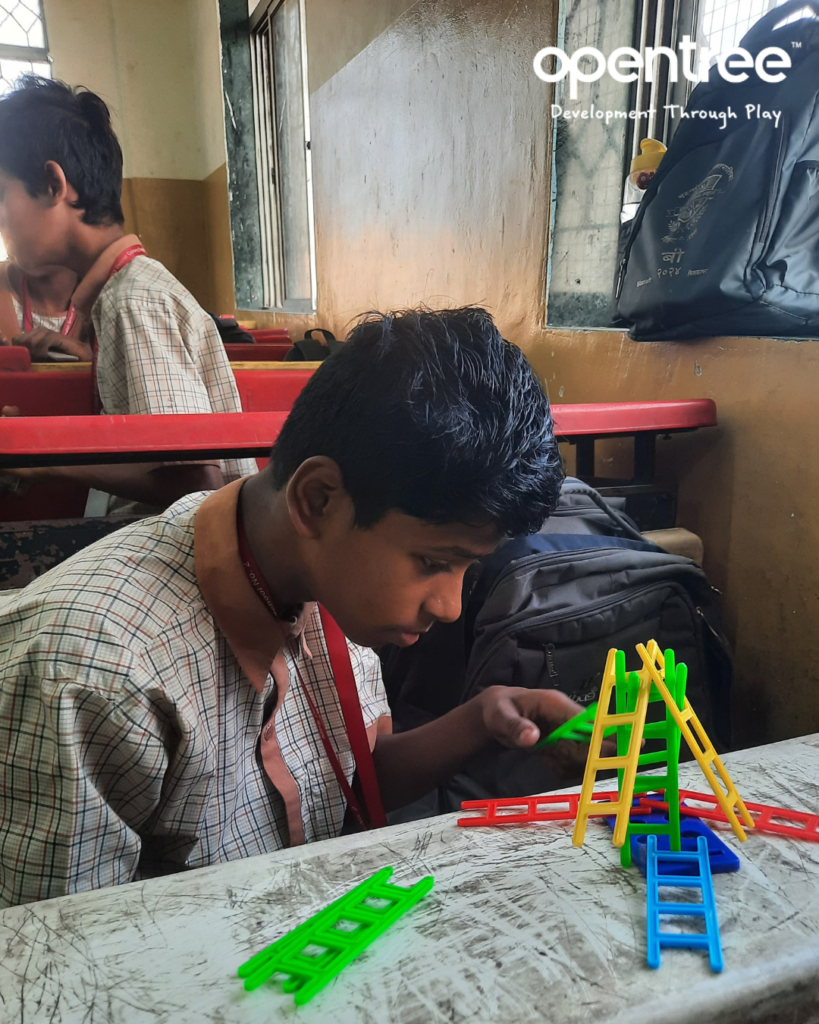
Our OPW noticed this and offered support. Together, they managed to balance 10 ladders and Afzal’s eyes lit up. However, this time, he wanted to try it on his own. With a nod of encouragement, he picked up the pieces again. This time, his hands were steadier and his focus was sharper. One by one, more steps of the ladder stood tall.
The children around him began to take notice and many came forward to help. When he finally completed the game, the entire class applauded and this made Afzal feel joyous. The same children who once distanced themselves from Afzal now gathered around him and also welcomed him into the groups. Play had created a space for empathy to grow. The next time our OPW went to the class, he saw that Afzal wasn’t sitting alone, he was surrounded by friends, laughing and playing with confidence.
Through a single game, play had shifted perspectives. It gave Afzal a voice, a platform to shine, and a way to connect with others on equal ground. For the other children, it taught powerful lessons in resilience, kindness, and the importance of inclusion.
Bridging the School Readiness Gap: New Play Programme launched in 65 Mumbai Anganwadis
“School readiness is not just about recognising letters or numbers – it is also about building behavioural and social skills in children. Play has a significant role in children’s development.”
– Sharad Kurhade, Child Development Project Officer
In India, the transition from early childhood education to formal schooling remains a critical juncture for children, particularly those from underserved communities. While there is a recent focus on improving foundational literacy and numeracy (FLN), the broader picture of school readiness is often overlooked. Many children enter formal schooling without the necessary readiness, facing challenges such as struggling to communicate, managing emotions, working collaboratively with peers, and adapting to structured classroom environments. These challenges, in turn, affect their ability to engage with academic content effectively, leading to frustration, disengagement, low learning outcomes and sometimes even dropouts.
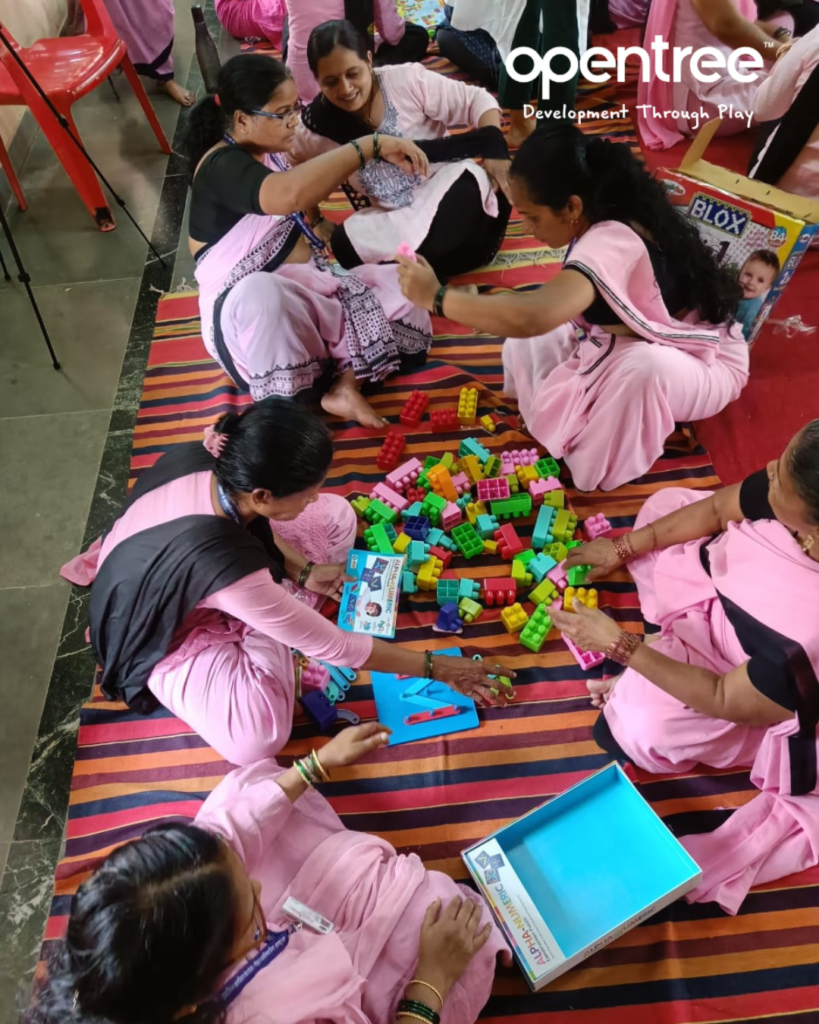
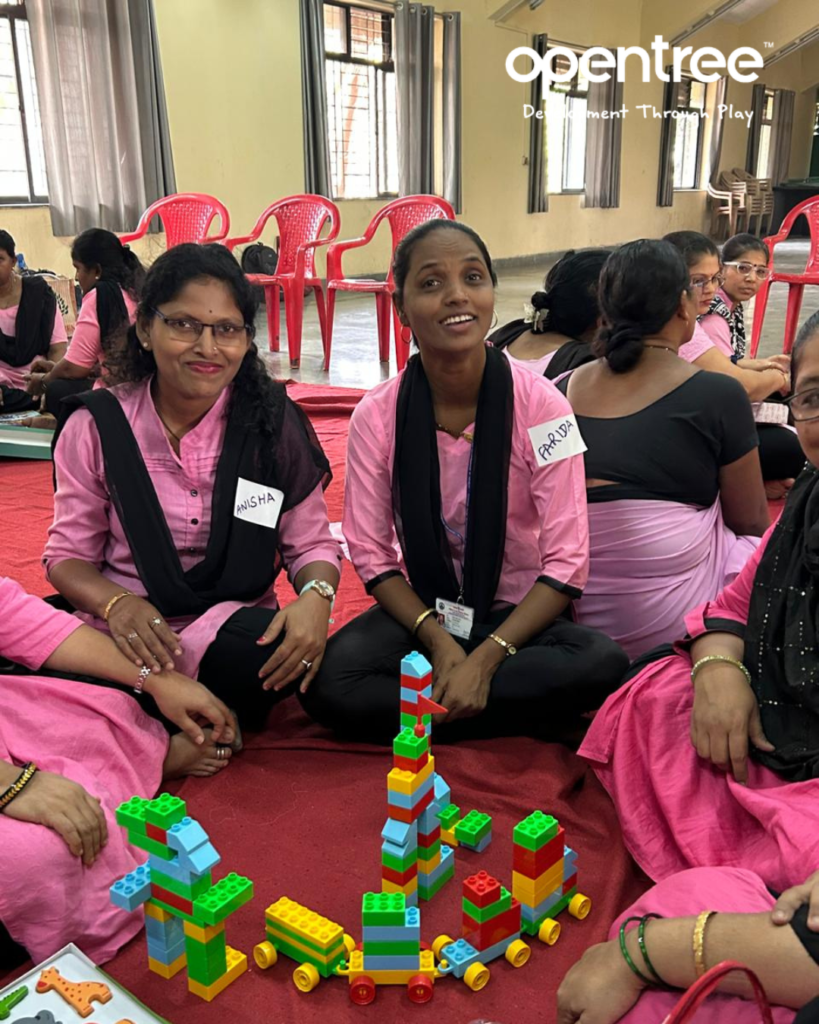
To address this gap, The Opentree Foundation launched the School Readiness Play Programme (SRPP) in March. The programme focuses on building behavioural, emotional, and social skills in anganwadi children, essential for a smooth transition to Class 1. SRPP was launched in 65 anganwadis in Mumbai, in partnership with the Integrated Child Development Services (ICDS), in presence of Sharad Kurhade from the District Women and Child Development Office.

“The inaugural workshop of the School Readiness Play Programme has been instrumental in empowering our anganwadi teachers to use the given play materials for children’s holistic development,” Kurhade said. “We are certain that our anganwadi teachers will use these play materials to build foundational skills – cognitive, social and emotional – in their anganwadi children, helping them transition to formal schooling happily and with confidence. We hope The Opentree Foundation can expand this programme to all 183 anganwadi centres under our jurisdiction, and are committed to supporting them.”
While The Opentree Foundation has implemented Life Skills play programmes for children from pre-primary to Class 8, this initiative sharpens our focus on ensuring that our youngest learners are truly ready for school.
Anganwadi teachers are the backbone of early childhood education, and make sure children enter formal school ready to learn and thrive.
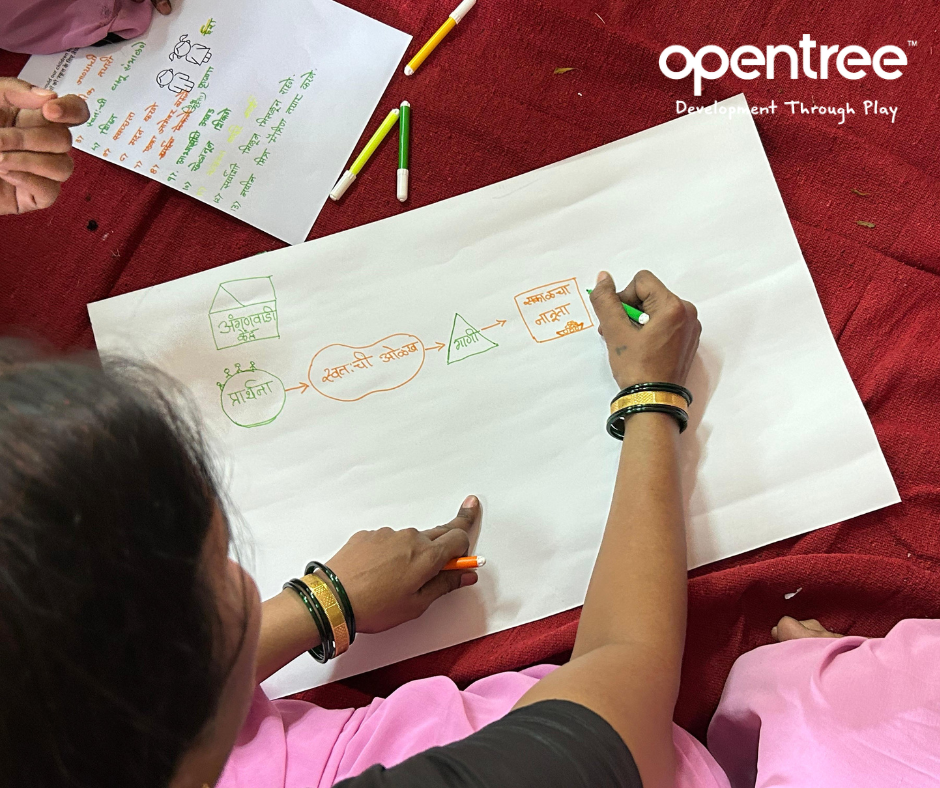
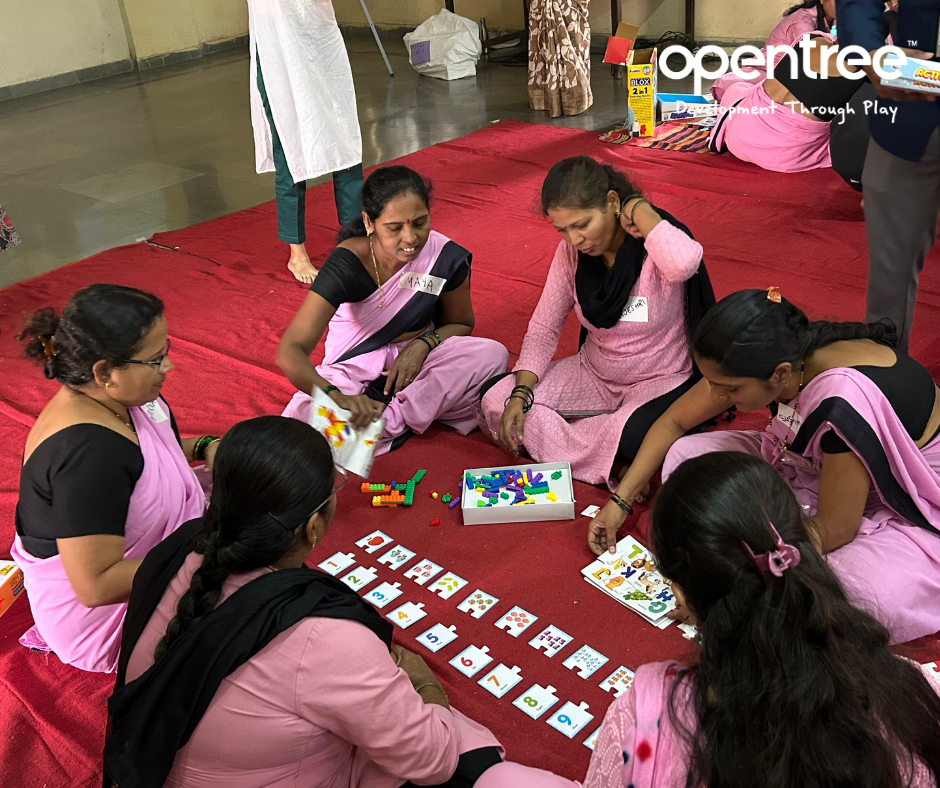
School readiness is more than just foundational literacy and numeracy — it’s also about emotional and behavioural preparedness. Through our programme, we are empowering anganwadi teachers with play-based learning to make school readiness more engaging and impactful. For children, confidence, adaptability and motivation play an important role in helping them transition smoothly into formal schooling. However, many children, particularly those from marginalised communities, struggle not only due to learning gaps, but also because they face difficulties in adjusting, which affects their curiosity for learning and self-confidence.
Excerpts of our conversation with Sharad Kurhade:
Importance of Play for Anganwadi Children
Many of our anganwadi children come from low-income families, where parents cannot afford expensive pre-school education. In homes where providing even two meals a day is a struggle for parents, being able to purchase and provide toys is a distant dream. As a result, our future generations are at a serious risk of losing their most fundamental childhood right – the Right to Play. The play material kits provided by Toybank are valuable in addressing this gap. They complement the materials from ICDS, and provide additional opportunities for building skills. These play materials will go a long way in making early childhood education at anganwadi centres more engaging, joyful and inclusive, ensuring improved school readiness in all children. Additionally, this will also create a positive perception of anganwadis as quality learning spaces, increasing enrollments.
Developmental Benefits for Children Through This Initiative
Learning through play is a globally recognised, integral approach for the holistic development of children. School readiness is not just about recognising letters or numbers – it is also about building behavioural and social skills in children. Play has a significant role in children’s development. Through play, children enhance their cognitive, physical, emotional, and social skills — fundamental aspects of human growth. Play makes learning fun and engaging, helping children explore and develop essential skills.
Annual Report 2023-24: Resilience, growth and Play
At The Opentree Foundation, we are proud to be pioneers in advocating for play as a vital catalyst for creating a better world. In a complex environment where many children feel unwanted and abandoned, play emerges as a cornerstone of healthy human development, offering essential opportunities for growth and connection.
Our mission is rooted in nurturing strengths among at-risk children who often face significant challenges, such as low self-esteem, poor learning outcomes, and difficulties in making positive decisions. Many of these children grapple with unclear core values, which complicates their ability to discern right from wrong.
We focus on fostering strengths in three key areas:
1. Access to Quality Play: We strive to create safe, engaging environments where children in need can thrive through meaningful play experiences.
2. Life Skills and Socio-Emotional Learning: Our robust play programs emphasize the development of crucial life skills, ensuring that children not only enjoy play but also learn to navigate their emotions and relationships effectively.
3. Empowering Educators: By equipping teachers with play-focused knowledge, resources and practices to become effective play practitioners, we transform classrooms into optimised learning environments.
The annual report highlights our work done throughout the year, including our Co-founder-CEO, Shweta Chari, representing the organisation at the International Play Association (IPA); schools turning into playful spaces; our work towards taking play to maximum children in India and more.
As we step into the next year, we continue to work towards ensuring that every child’s Right to Play is realised, and that play is made an integral part of every childhood in India.
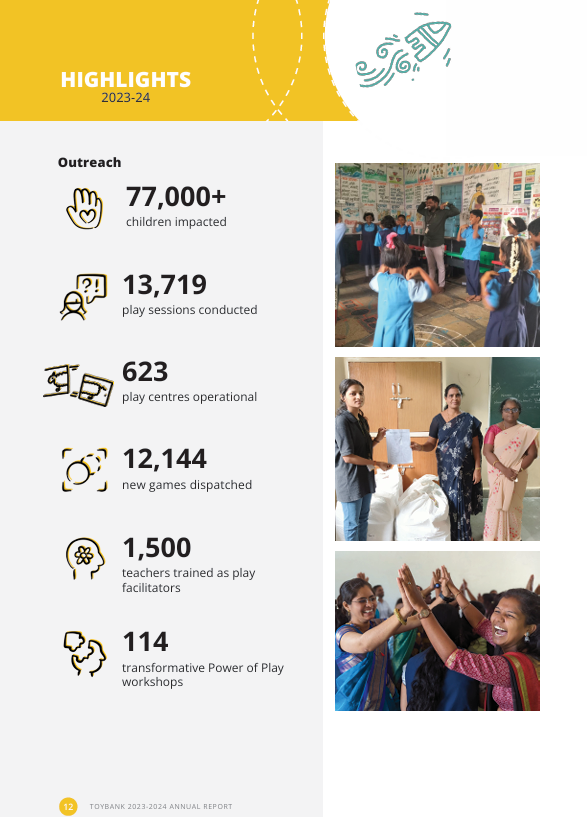
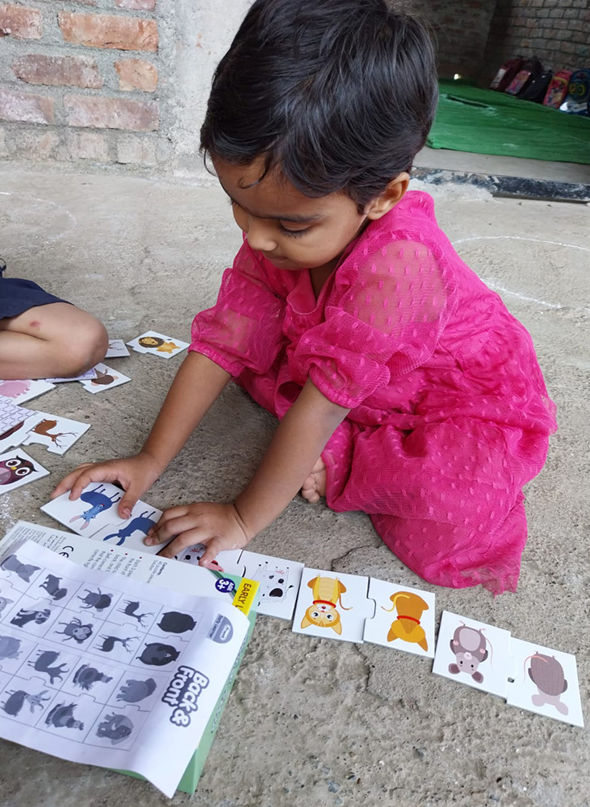
“The stories of impact we encountered this year inspire us – schools building their own play spaces, children designing games.
Shweta Chari, Co-founder, CEO, The Opentree Foundation
Art, Imagination, and Play: A Vibrant Day at Kala Ghoda Arts Festival 2025
“It was inspiring to see how freely they translated their thoughts into art, reminding me that imagination has no limits when given the right space to grow.”
– Grade 11 ABWA CAS volunteer
On January 29, 2025, we partnered with Aditya Birla World Academy (ABWA), to co-create a vibrant and inclusive play session at the Kala Ghoda Arts Festival. The collaboration brought together over 60 enthusiastic students from ABWA and 41 of children from The Opentree Foundation’s play centres, who celebrated the power of play, creativity, and connection. This wasn’t just an event — it was a reminder of how play can break down social barriers and empower every child to express themselves freely.

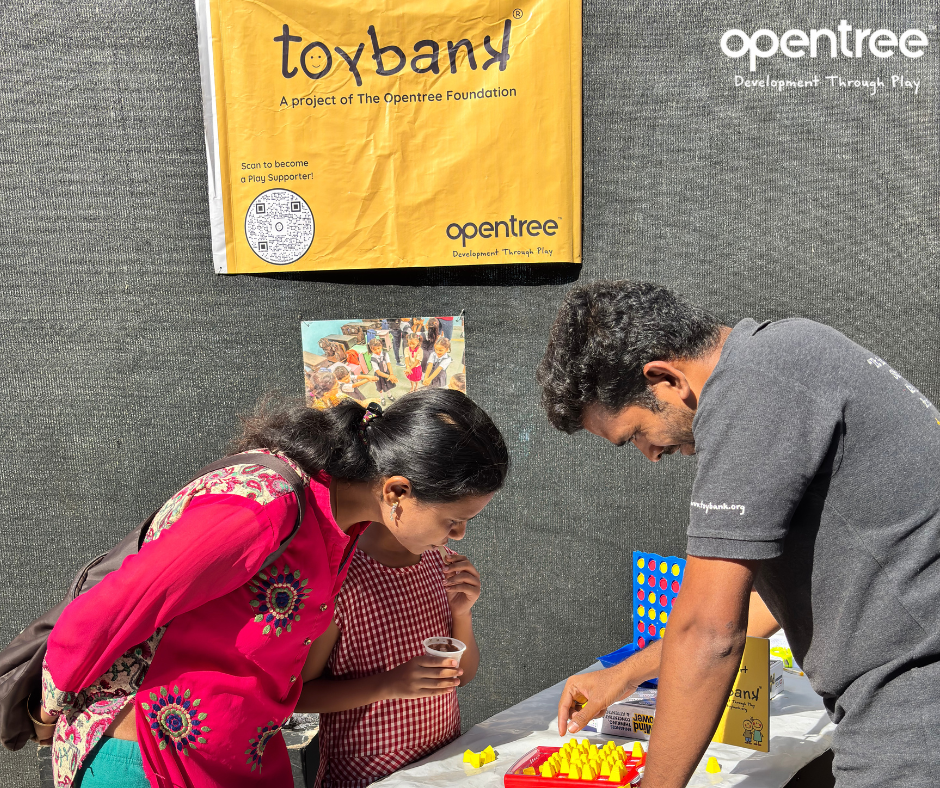
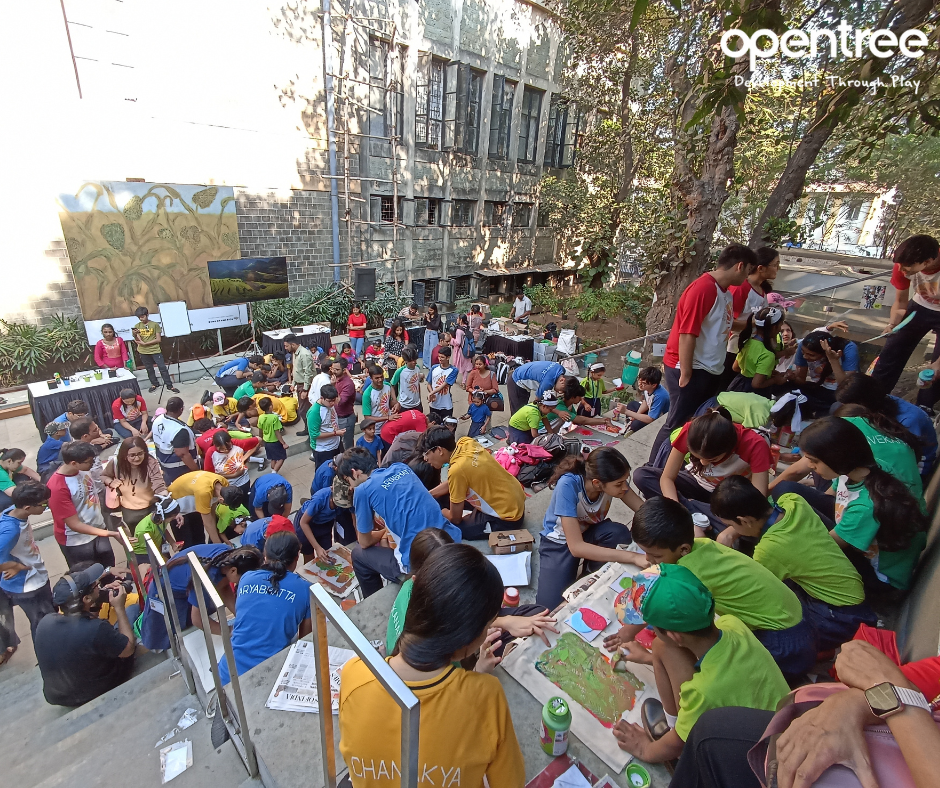
A Canvas of Creativity and Connection
The session was a colourful fusion of artistic exploration and joyful interaction. Children immersed themselves in:
- T-shirt and bag stencil painting – Letting their imaginations run wild, children designed unique pieces that reflected their inner worlds.
- Loose parts play – Using everyday materials like U-pins, paper cups, and clay, the children created their own ‘imaginary friends’ —characters born entirely out of creativity and personal interpretation.

These hands-on activities encouraged self-expression, problem-solving, and collaboration. Children weren’t just making art — they were communicating ideas, forming bonds, and stepping into each other’s imaginative universes.
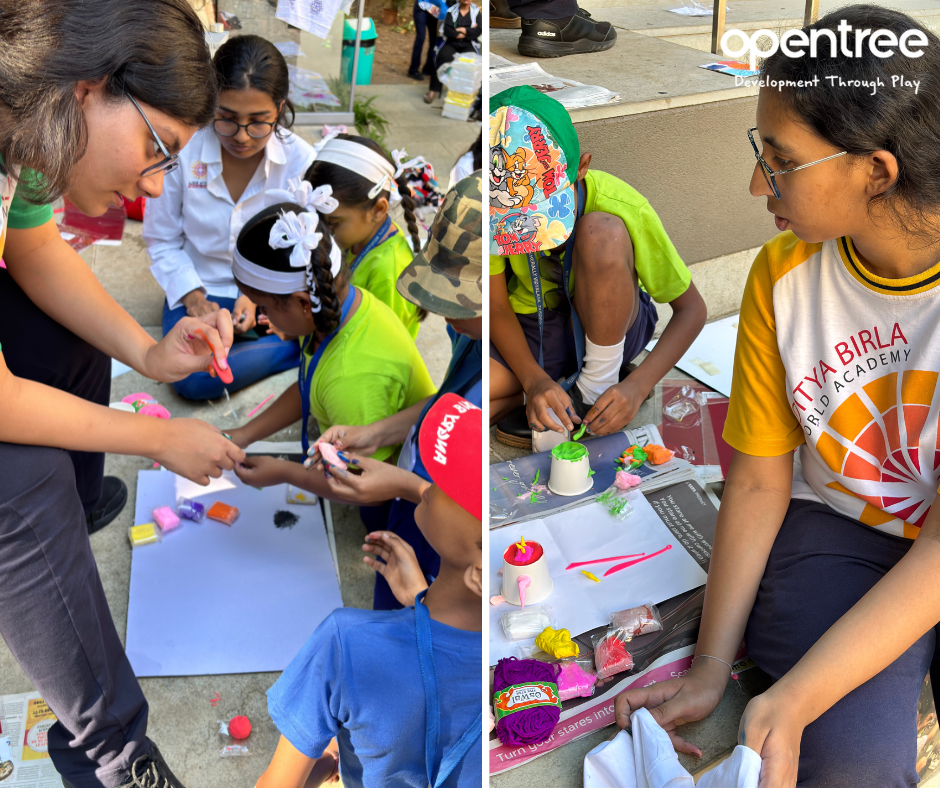
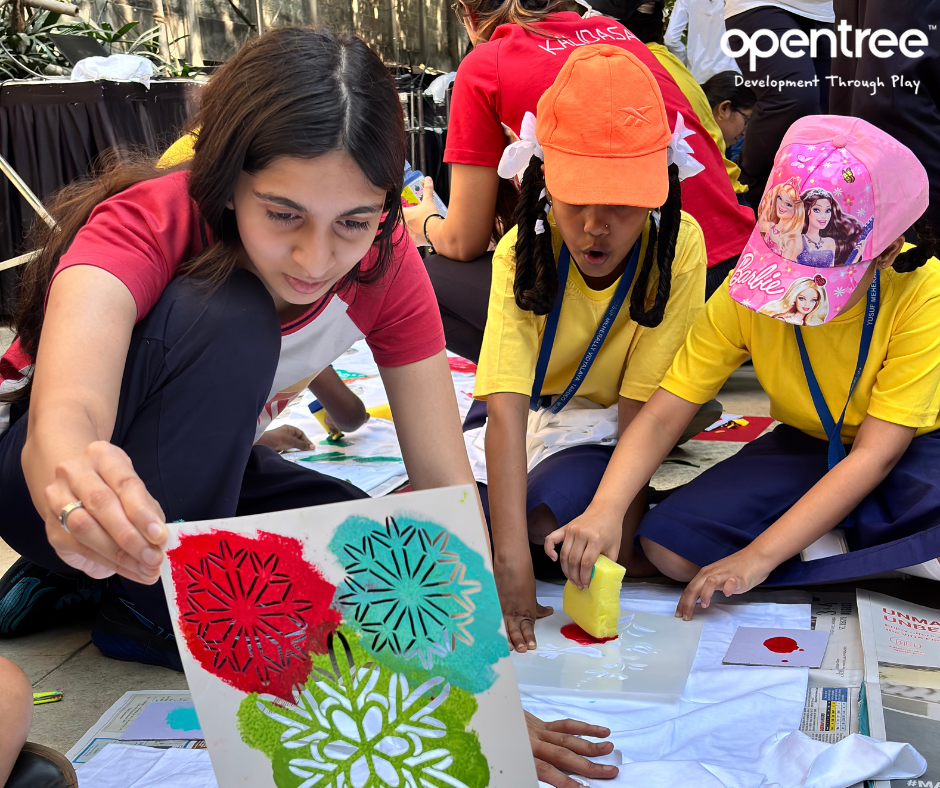
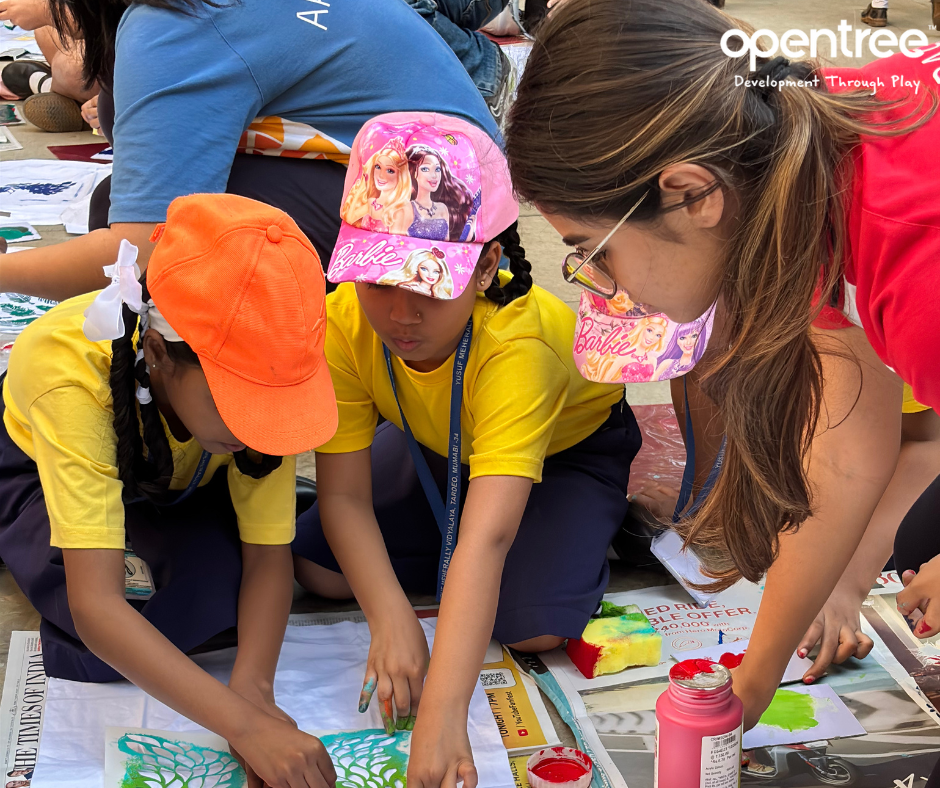
Play Beyond the Classroom
This session stood as a powerful testament to how unstructured play fosters critical life skills like creativity, empathy, critical thinking, and teamwork. Through shared experiences, children learned not only about themselves but about each other—celebrating differences, building confidence, and finding common ground through joyful engagement.
“Through this activity, I learned the importance of self-expression and creativity in a child’s development,” a Grade 11 ABWA CAS volunteer said. “It was inspiring to see how freely they translated their thoughts into art, reminding me that imagination has no limits when given the right space to grow.”

For the students of ABWA, it was a day of reflection and inspiration. For children from our play centres, it was a moment of recognition and freedom. And for us, it was yet another affirmation of the transformative power of play.
Universal Legal Runs for Every Child’s Right to Play at Tata Mumbai Marathon 2025
On January 19, 2025, Universal Legal proudly participated in the Tata Mumbai Marathon, supporting The Opentree Foundation and its mission to ensure every child’s Right to Play. The Opentree Foundation believes in the transformative power of play — fostering creativity, emotional resilience, and social skills that are essential for a child’s holistic development.



A long-time supporter of The Opentree Foundation, Universal Legal joined hands once again with renowned artist and our very own Play Ambassador, Arzan Khambatta, who not only ran to spread awareness but also helped raise vital funds — ensuring more children gain access to safe, structured, and meaningful play. The team’s energy and enthusiasm beautifully reflected the spirit of play: vibrant, inclusive, and full of joy.


Here’s what the Universal Legal team had to say:
“Participating in the Dream Run at the Tata Mumbai Marathon 2025 was a truly memorable experience for all of us. We were proud to support The Opentree Foundation, an extraordinary organisation we’ve been associated with since our inception in 2004. Their commitment to promoting the Right To Play is something we deeply resonate with. Play is not just fun — it’s foundational to a child’s development, and we’re honoured to amplify this message alongside them.”


“Our team brought the streets to life with colorful placards, creative props, and a whole lot of energy. It was more than a run — it was a celebration of a cause we believe in. The joy, camaraderie, and awareness we helped create on that day was truly heartwarming.”
“A heartfelt thank you to all the generous donors who helped make this initiative so impactful. Your contributions are creating real change — opening doors for more children to experience the joy and growth that comes from play. Your support means the world to us, and more importantly, to the children who benefit from The Opentree Foundation’s work.”

As we look back on this incredible journey, we are especially proud to mark our 20-year-long association with The Opentree Foundation. From humble beginnings to becoming a powerful advocate for child development through play, their journey has been inspiring. We are excited for what lies ahead as we continue this partnership and work together to make a lasting impact in the lives of children everywhere.”

Child Wellbeing Through Play: Insights from Our Play Seminar
On December 14, 2025, The Opentree Foundation (TOF) hosted a Play Seminar – Child Wellbeing Through Play at the Armaity Desai Hall at the Tata Institute of Social Sciences, Mumbai. It was attended by over 100 engaging, enthusiastic play supporters from diverse spaces of academia, education, urban design, psychology, philanthropy and the social sector. It was heartening to see an auditorium and a courtyard bustling with participants throughout the day, showing a shared commitment and passion for play and play advocacy.

The keynote speakers for the event were Farida Lambay, Co-Founder, Pratham Education Foundation, and Anmol Sagar, IAS, CEO of Latur District, where TOF’s play programmes impact over 10,000 children across 50+ schools.


Lambay spoke at length about the various socio-economic barriers that limit children’s access to play, highlighting that even with the inclusion of Play in the National Education Policy (NEP) 2020, there remain considerable gaps in the implementation of play-centric teaching methods and the integration of play into learning spaces. Sagar, who has witnessed the impact of TOF’s programmes in Latur, spoke about play as a key tool for helping children develop positive attitudes towards school and learning, and urged organisations like TOF, and experts to come forth and collaborate with the government on more scalable, low-cost models of play-centric learning.
A Play-centric Space

Play is ubiquitous – we are surrounded by Play, and yet, we often fail to notice it. At this seminar, along with fostering dialogue and collective action on play, one of our goals was to create as many opportunities as possible for everyone to observe, recognise, and reflect on the presence of play all around.
The essence of Play and playfulness was a key element of the experience design of the seminar. Our team created a series of interactive ‘play nooks’, that gave participants a chance to relive their own play memories, to understand some of the games used as part of project Toybank’s Conscious Play® approach, and invited them to reflect and collectively brainstorm solutions to these big questions: How can play become a part of learning environments? What can be done to make play accessible and equitable for children from underserved communities?
At these exhibits, participants also had a chance to understand the impact of TOF’s life skills play programme, which was also the focus of a session on Assessing through Play.
Panel Discussion - The Child and Play: Current Realities & Way Forward

The lack of equitable access to play is a complex problem, one that is deeply enmeshed with other socio-economic-cultural factors, and needs to be addressed through an ecosystem of mindset change, policy reform, capacity building and resource allocation. It is important that the child’s Right to Play is examined in the context of all these factors, along with defining the roles of various stakeholders in realising it.
These diverse perspectives on play came together in the form of a panel discussion titled ‘The Child and Play: Current Realities & Way Forward’ at the seminar, chaired by Ingrid Srinath, Founder-Director of Centre for Social Impact and Philanthropy. The panelists were:
- Prof. (Dr.) Shubhada Maitra, former dean of the School of Social Work, TISS and an expert on children’s welfare, mental health, gender and play
- Ms. Samriti Makkar Midha – a clinical psychologist and expert on play therapy, child protection, diversity and inclusion
- Mr. Luis Miranda, chairman of the Indian School of Public Policy
The panelists navigated questions on where play can find a place in children’s well-being and cognitive development, the need to reimagine ecosystems through play-centric design and approaches, the role that socio-economic adversity, gender, geography play in enabling or restricting access to play.
Play in Practice: Parallel Sessions

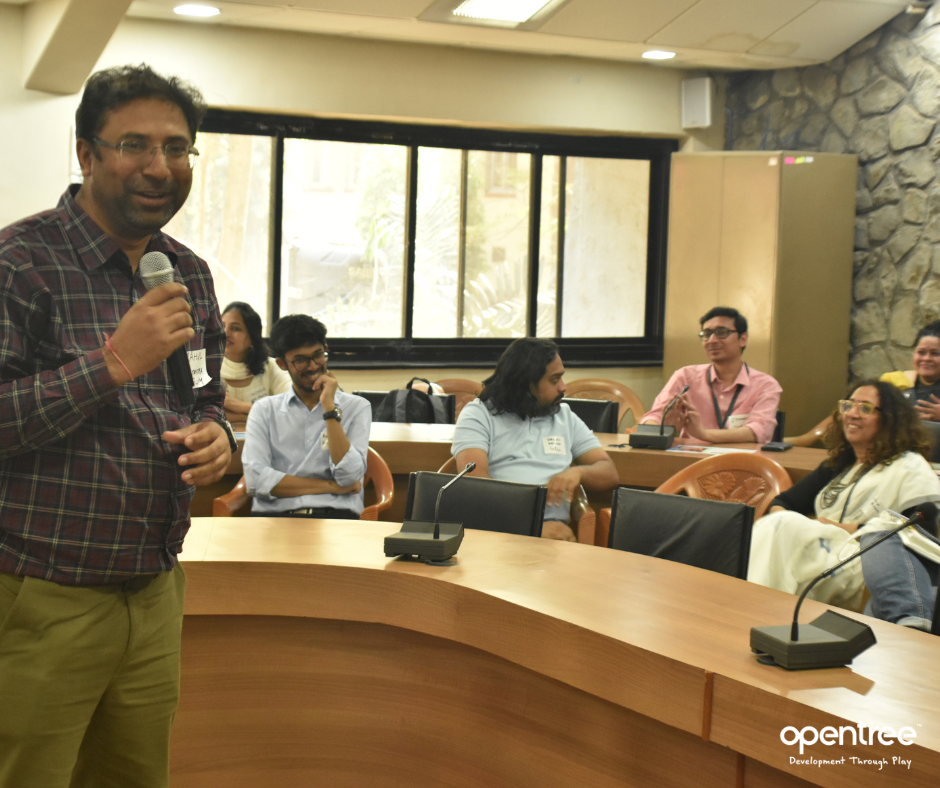
One of the highlights of the seminar were the sessions led by play practitioners – experts who use play as a tool for change in their own practices and contexts. The first session, ‘Beyond Toys: Beyond Toys: Creating a Culture of Playfulness for Families and Communities, was conducted by Dr. Krishna Kulkarni, a play researcher who uses playful practices to advise parents on fostering safe, joyful interactions and spaces with children. In Urban Spaces for Play, Sarfaraz Momin, the Co-Founder of StudioPOD spoke at length about how play can consciously be integrated into the design of spaces, and how play-centric design fosters wellbeing, cognitive development, and creates more equitable access for play.
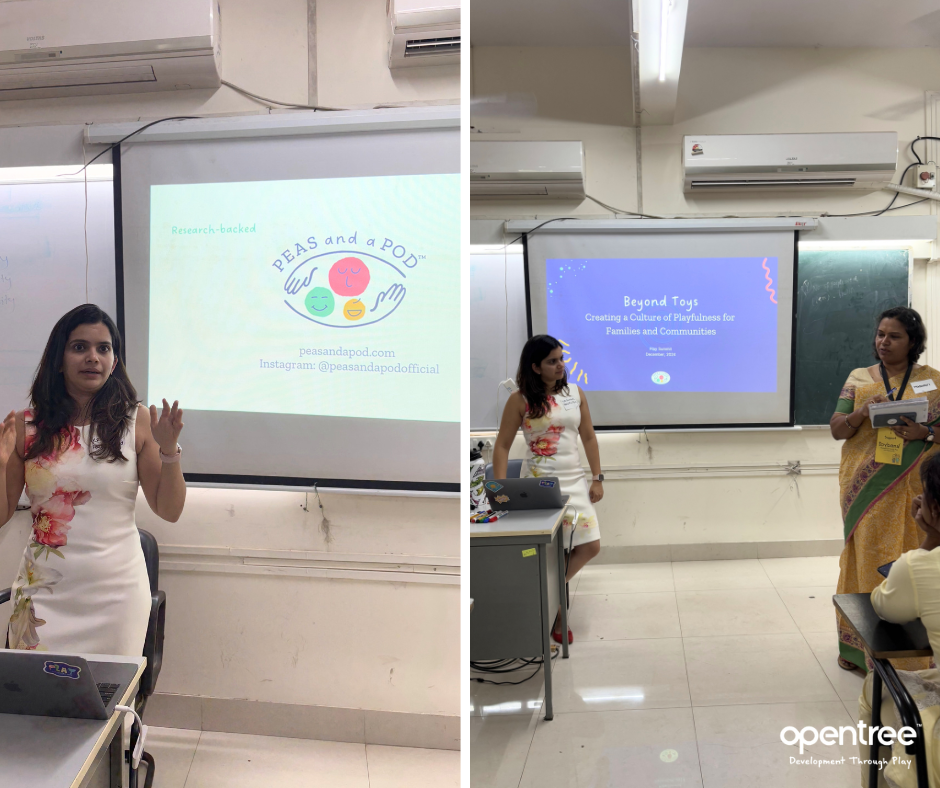
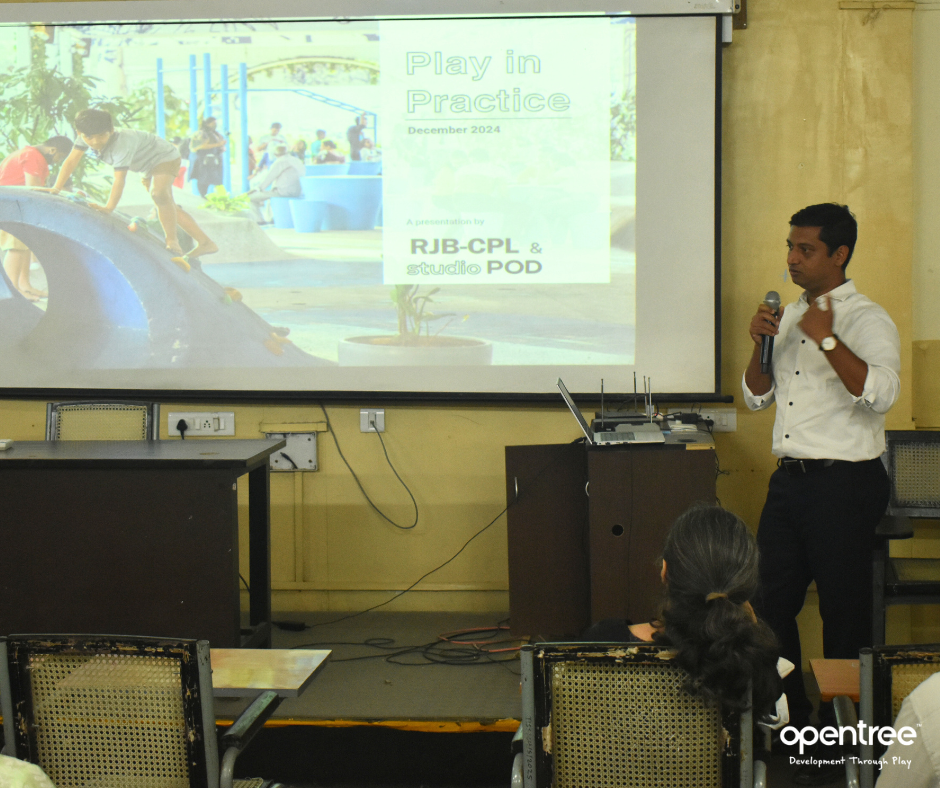
The third session, How Play Makes Sense: Integrating Play in Schools & Communities and its Impact on Children was conducted by Rahul Aggarwal and Kuldeep Kannoujiya from Swatantra Talim, a Lucknow-based organisation that works to build children’s skills and agency through play-centric activities and environments. This session wove elements of free play, puppetry to give participants an immersive experience. These sessions inspired participants with ideas on how to integrate play into their own context, to address children’s needs and overcome barriers to play.
Workshop: Rediscovering Play
Facilitated by the The Opentree Foundation’s team, this 45-minute workshop was a space for participants to revisit play in their childhood, reflect on the paucity of play as we become adults, and to immerse themselves in a state of playfulness where they used their imagination to bring abstract objects to life. The workshop brought out rich reflections – from the role of stress in our fast paced lives, to the lack of non-judgemental, safe spaces where one can be playful, to the need for being open to newer, less structured ways of thinking and finding solutions.
Launch: Play is Everywhere
With all the participants in a playful state of mind, TOF announced the launch of Play is Everywhere, a crowdsourced digital archive that will inspire all of us to be more aware of play round us, to think more critically about what enables or deters access to play and the intermingling of culture with play. You can follow us here.
Assessing Play through Play

In the two decades of our work at The Opentree Foundation, a question that we have tried to address is: How do you measure Play? Play is not linear; its impact of play is largely visible through observation or interaction with children, and the outcome varies from child to child. Over the years we have conducted assessments, observations and case studies that document the impact of play on skills, socio-emotional development, school attendance and learning outcomes; and yet, there remains a large gap in terms of a shared body of knowledge, or even shared evidence on measuring the impact of play in the Indian context.
As our programmes have evolved, we also have steadily worked on bridging this gap in terms of resources and research on assessments for play in India. At the play seminar, Shweta Chari, CEO and Co-Founder, The Opentree Foundation, presented this journey of evolution of impact measurement for play, along with Vijaya Balaji, founder, Social Lens, which is our partner for data analysis and impact measurement.
In their session, Shweta and Vijaya reflected on the lack of structured tools and methods to measure the impact of play, beyond traditional surveys and questionnaires, and introduced TOF’s play-based assessment of life skills, which will be the first every framework of its kind in India that uses play to measure play.
Call for Collective Action
The seminar concluded with a call to action, for participants to come forward and sign up for a Play Collective, which will bring together a group of driven play advocates who will leverage their individual strengths, influence, resources and expertise to initiate collective action for mainstreaming play in schools, communities and public spaces in India. Through this Play Collective, The Opentree Foundation will spearhead play-centric research, innovation and policy change, paving the path for realising the Right to Play for every child in India.

